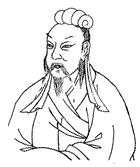Yang Xiong

Yang Xiong (Yang Hsiung) was a prolific yet reclusive court poet whose writings and tragic life spanned the collapse of the Former Han dynasty (202 BCE-9 CE) and the brief and catastrophic usurpation of the throne by the Imperial Regent Wang Mang (9-23 CE). He is best known for his assertion that human nature originally is neither good (as argued by Mencius) nor depraved (as argued by Xunzi) but rather comes into existence as a mixture of both. Yang Xiong’s chief philosophical writings – an abstruse book of divination known as the Tai xuan (The Great Dark Mystery) and his Fa yan (Words to Live By), a collection of aphorisms and dialogues on a variety of historical and philosophical topics – are little known even among Chinese scholars. These works combine a Daoist concern for cosmology, but may be best described as a product of the intellectual and spiritual syncretism characteristic of the Han dynasty (202 BCE-220 CE). As a social critic and classical scholar, he is considered to be the chief representative of the Old Text School (guxue) of Confucianism. Although some think he was one of the most important writers of the late Former Han, he had little influence during his own time and was vilified for his association with the usurper Wang Mang. Consequently, his works have largely been left out of the Confucian canon.
Life and Writings
Yang Xiong was born in 53 BCE in the western city of Chengdu in the province of Shu. His biography in the Qian Han Shu (History of the Former Han) remarks that Yang Xiong was fond of learning, was unconcerned with wealth, office, and reputation, and suffered from a speech impediment and consequently spoke little. As a youth he probably was a student of Zhuang Zun, a reclusive marketplace fortune teller who refused to take office, opting instead to use divination and fortune-telling as a means to encourage virtue among the common people. Before coming to the capital he gained renown for his poetic writings, in particular for his fu, a poetic genre associated with an earlier native of Shu, Sima Xiangru (179-117 BCE). Yang Xiong’s reputation as a poet eventually reached the capital of Chang’an, and around 20 BCE he was summoned to the court of Emperor Cheng. Between the years 14-10 BCE, Yang Xiong submitted several poetic pieces commemorating imperial sacrifices and hunts, and finally in 10 BCE he was appointed to the humble office of “Gentleman in Attendance” and “Servitor at the Yellow Gate,” where he would remain until his final days. While not much is known of Yang Xiong’s activities as a lowly official at the Han court, it appears that, as far back as 9 BCE, Emperor Cheng issued a decree excusing him from the direct official service, while maintaining an official title, salary, and access to the imperial library for him.
Shortly after his appointment, Yang Xiong became disillusioned with the rectifying power of his poetry and stopped writing it for the court. Yang Xiong’s decision appears to have coincided with the death of his son, a tragedy which left him despondent and financially impoverished. Over the next two decades he produced his two works on philology: Cang Jie xun zuan (Annotations to the Cang Jie), a compilation of annotations to the Qin dynasty’s official imperial dictionary, and Fang yan (Dialects), a collection of regional expressions. During this period, he also produced his Tai xuan (The Great Dark Mystery), which he completed around 2 BCE, and Fa yan (Words to Live By), which he completed in 9 CE – right about the time that the Imperial Regent Wang Mang usurped the throne and established the brief Xin dynasty (9-23 CE).
|

